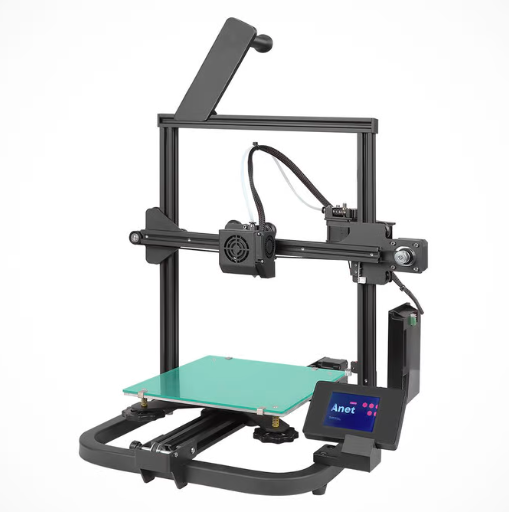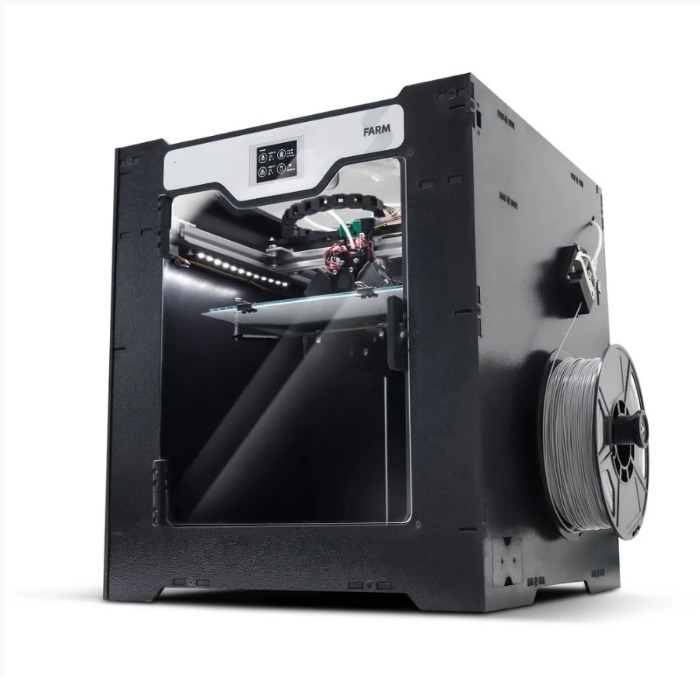Compare A8 V2 vs FARM
Comparison between the best 3D printers
Choose the best 3D printer at the best price. The cheapest 3D printers are here.
Buy a 3D printer here with 3D Fila.
 |
 |
|
| Model | A8 V2 |
FARM |
| Printing Material | Filament | Filament |
| Buy Filament for Anet A8 V2 | Buy Filament forSethi 3D FARM | |
| Estimated price | $129,00 | $1127,00 |
| Manufacturer | Anet | Sethi 3D |
| Release Year | 2021 | 2021 |
| Print Volume [mm] | 220x220x250 | 240x240x240 |
| Printer Size [mm] | 428x441x486 | 550x42x500 |
| Weight [kg] | 6,2 | 15,7 |
| Power Loss Recovery | NO | YES |
| Enclosed printer | NO | YES |
| Bed Leveling | Manual | Automatic |
| Filament End Sensor | NO | YES |
| Bed type | Heated | |
| Power supply system | Bowden | Bowden |
| Standard nozzle | 0,4 | 0,4 |
| Maximum Nozzle Temperature [°C] | 230 | 270 |
| Maximum Bed Temperature [°C] | 120 | |
| Maximum printing speed [mm/s] | 150 | 80 |
| Filament holder | YES | YES |
| Camera for supervision | NO | NO |
| Recommended filaments | PLA | PLA, PETG, Tritan, Flex, ABS |
| Recommended slicers | Cura, Simplify, Slic3r, IdeaMaker | Cura, Simplify, Slic3r |
| Maximum Resolution [mm] | 0,1 | |
| Processor | ||
| Display | Display touchscreen 2,8'' | Touchscreen TFT |
| Power Supply | 110/220V / 250W | 450 W |
| Connectivity | SD / USB | USB |
| Operating systems | Windows, Mac, Linux | Windows, Mac, Linux |
| Date of registration in the system | 2022-11-10 | 2022-10-11 |
| Release date | 2021 | 2021 |
| Extra features | The Anet A8 V2 is a Cartesian-XZ type 3D printer with a build volume of 220 x 220 x 250 mm, Ender 3 design and V-slot assembly. It has a 32-bit motherboard and touchscreen interface, promising ease of use. It uses open source firmware and has thermal failure protection. It stands out for its cable organization and the absence of a heated bed, focusing on energy savings and PLA printing. It comes with an external power adapter, aiming at greater safety, especially for beginners and educational use. | Sethis Farm printer offers a generous 240 x 240 x 240 mm print area, ideal for large projects. Its intuitive touchscreen display makes it easy to operate, while the intelligent sensor prevents problems by detecting filament shortages or jams. Its power recovery feature allows you to resume printing after interruptions. It stands out for its 9-point optical auto-leveling and high-performance heated bed, ensuring accuracy and versatility on different materials. Its 32-bit electronics and silent drivers promote a smooth and efficient experience. In addition, the Farm has a closed cabinet, expanding the range of usable polymers, and a turbo cooling system to speed up the process between prints. The machine also offers practicality with a storage drawer and simplified software updates. |
| Support for multiple colors and materials (AMS and CFS) | NO | NO |
Notes * |
||
| Cost-benefit | 6 / 10 | 6 / 10 |
| Hardware | 0.5 / 10 | 2.5 / 10 |
| Tela | . | . |
| Print volume | 3 / 10 | 3 / 10 |
| Performance | 1 / 10 | 0 / 10 |
Conclusion |
| In comparing the Anet A8 V2 and the Sethi 3D FARM, it is evident that each printer has unique strengths and targets different user needs and budgets. The Anet A8 V2 comes at a significantly lower price point, making it an excellent choice for beginners or those looking to explore 3D printing without a large initial investment. Its build volume is adequate for basic projects, and its focus on simplicity and energy efficiency makes it suitable for educational settings or casual use. However, it lacks advanced features like automatic bed leveling, power loss recovery, and enclosed printing, which may limit its versatility and reliability for more complex or demanding prints. On the other hand, the Sethi 3D FARM, although significantly pricier, offers numerous advanced features that enhance its usability for serious hobbyists or professionals. With a larger print volume, automatic leveling, and power recovery capabilities, it provides a more robust and hassle-free printing experience. Its enclosed design allows for printing with a wider array of materials, making it a suitable option for users looking for versatility in their projects. Ultimately, the decision hinges on the user’s specific needs. For newcomers on a budget aiming for basic functionality, the Anet A8 V2 represents compelling value. Conversely, those seeking enhanced performance, reliability, and versatility in their 3D printing endeavors may find the investment in the Sethi 3D FARM to be justified. |

